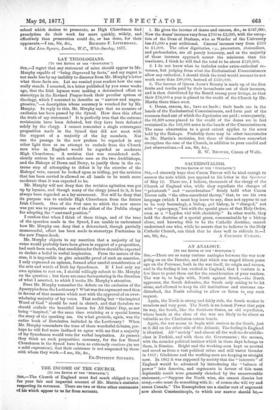LAY THEOLOGIANS.
[To THII EDITOR OF THB SPBOTATOR."1 8131,—I regret that any statement of mine should appear to Mr. Murphy capable of "being disproved by ficts," and my regret is not made less by my inability to discover from Mr. Murphy's letter what those facts are. Let me remind your readers how the case really stands. I asserted, in a letter published by you some weeks ago, that the Irish laymen were making a determined effort to stereotype in the Revised Prayer-book their peculiar system of -theology, which I ventured to describe as "narrow and unpro- gressive,"—a description whose accuracy is vouched for by Mr. Murphy. In reply to this, Mr. Murphy says that no measure of
exclusion has been passed by the Synod. How does this affect the truth of my statement ? It is perfectly true that the extreme revisionists have been defeated, but they have been defeated solely by the clergy. I cannot remember a single extravagant
proposition made in the Synod that did not meet with the support of a majority of the lay members. Nor ean the passage in the new preface be regarded in any other light than as an attempt to exclude from the Church men who in England would be regarded as moderate High Churchmen. A revision that was considered suffi- eiently serious by such moderate men as the two Archbishops, and the Bishops of Down and Derry, to justify them in the ex- treme step of attempting to defeat it by the exercise of the Bishops' veto, cannot be looked upon as trifling, yet the revision that has been carried is allowed on all hands to be much more moderate than it was expected to be.
Mr. Murphy will not deny that the revision agitation was got up by laymen, and though many of the clergy joined in it, it has always been regarded as a lay movement. Nor will he deny that its purpose was to exclude High Churchmen from the future Irish Church. One of the first uses to which the new canon was put was to prosecute one of the ablest of the Dublin clergy for adopting the "eastward position."
I confess that when I think of these things, and of the tone
of the speeches made in the Synod, I am unable to understand how Mr. Murphy can deny that a determined, though partially unsuccessful, effort has been made to stereotype Puritanism in the new Prayer-book.
Mr. Murphy objects to my assertion that a majority of lay votes would probably have been given in support of a proposition, had such been made, that candidates for Orders should be expected to declare a belief in verbal inspiration. From the nature of the case, it is impossible to give scientific proof of such an assertion.
I only expressed an opinion, formed after careful consideration of the acts and words of Irish lay Synodsmen. If I had only my own opinion to rest on, I should willingly submit to Mr. Murphy on the question ; but there are some facts pointing in the direction of what I asserted, to which I invite Mr. Murphy's attention.
Does Mr. Murphy remember the debate on the exclusion of the
Apocrypha from the Lectionary ? What was the argument used then in favour of that measure which met with the approval of an over- whelming majority of lay votes. That nothing but "the inspired Word of God" should be read in church, and that therefore we should exclude the beautiful lesson for All Saints' Day, as not being "inspired," at the same time retaining as a special lesson the story of the speaking ass. On what grounds, again, was the entire book of Revelation included in the Lectionary ? When Mr. Murphy remembers the tone of these wonderful debates, per- haps he will feel more inclined to agree with me that a majority of lay Synodsmen would vote for verbal inspiration. At present they think no such proposition necessary, for the few Broad Churchmen in the Synod have been so extremely cautious (to use a mild expression), that their existence is not suspected by those with whom they work.—I am, Sir, &c., EX-DIVINITY STUDENT.


































 Previous page
Previous page